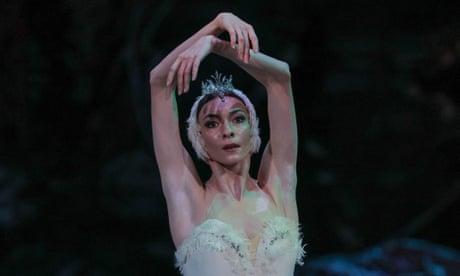- by foxnews
- 03 Apr 2025
‘I couldn’t keep it inside’: ballet star Olga Smirnova on quitting the Bolshoi and fleeing Russia
‘I couldn’t keep it inside’: ballet star Olga Smirnova on quitting the Bolshoi and fleeing Russia
- by theguardian
- 06 Apr 2022
- in news

Speaking via video call from Amsterdam, she explains her reason for leaving: "It did not feel safe." Although there had been no direct threat from the authorities, she adds: "I just felt the atmosphere was tense in the country. International flights were being cancelled and there were rumours the borders would be closed, so we decided to leave. We didn't want to risk it and wait longer."
She knew making such a statement would put her in the spotlight. Why did she do it? "I don't know," she says. "I just felt I needed to speak out. I couldn't keep it inside. There were many artists who spoke out. I admire Russian literature. Dostoevsky and Tolstoy are my favourite writers and you learn from their example that you must speak honestly and openly."
Smirnova barely heard from her Bolshoi colleagues, save for a couple of "supportive and touching" messages. "People are afraid to speak out. If they don't have any choice but to stay, they prefer not to speak out. Everyone should be able to decide what type of society they want to live in and how much freedom one needs for living."
Appearing to criticise the Russian regime can have consequences. The Bolshoi theatre's general director Vladimir Urin is among a number of cultural leaders who signed a letter against the war. At a meeting with arts laureates last Friday, Putin suggested merging the directorship of the Bolshoi theatre with St Petersburg's Mariinsky theatre under its director and Putin loyalist Valery Gergiev, implying that Urin would be ousted.
"I never followed politics," says Smirnova, being careful with her words. "But politics became impossible to ignore, which is why I spoke out against the war. War is an unacceptable way in our civilised world to resolve any conflict." Besides wanting the war to stop as soon as possible, she worries about the future relationship between Russia and the rest of the world. "It's really painful," she says. "Because it's also about the reputation of the whole Russian people. Russia's reputation has been severely damaged by the actions of Russia's government."
Smirnova's parents are still in Russia. They only knew she had left when the DNB announcement was made. "Only then could I speak to them and explain the situation," she says. "And, of course, for them it was really hard to accept. First of all, because they are parents and want to have me close. They are upset, they wanted me to stay, but I think they just need more time to accept and understand my decision."
When the invasion began, Smirnova was recovering from an injury, so wasn't caught up in the busy daily schedule of rehearsals and performances. "It helped to see the situation from outside," she says. After making the decision, she had five hours to pack her things. She and her husband initially flew to Dubai, then on to Amsterdam where Smirnova started rehearsals the next day.
She had always wanted to work internationally: she has loved working with visiting choreographers at the Bolshoi, loves the modernity of the repertoire at DNB, and dreams of dancing ballets by its resident choreographer Hans van Manen. Still, these are not the circumstances she would have chosen.
She is already rehearsing for a new production of Raymonda, opening in April. Is she able to concentrate in the studio? Smirnova smiles and visibly relaxes. "It is real happiness to be able to rehearse again," she says. "In some way, it saves you from the chaos outside. I can say it's the safest place, where I can be quiet and concentrate. I'm so glad I could rehearse from the first day I was here."
Smirnova plans to stay in Amsterdam for the foreseeable future, having no idea what that future holds. "The company made a warm welcome for me," she says. "I will try to do my best for them." Whether she will be able to return to Russia is moot. "To come back to Russia, I think probably I would need to take my words back. And there's no way I can do that. Of course I would like to see my parents, be able to go to my native St Petersburg. But the future is so uncertain now, both the country's and my own."
- by foxnews
- descember 09, 2016
Flight passenger says man deliberately squatted in window seat, ignites social media debate
An airline flyer said a seat squatter tried to tell her to swap seats with him, but she stood her ground, prompting a social media debate. A travel expert weighs in.
read more


